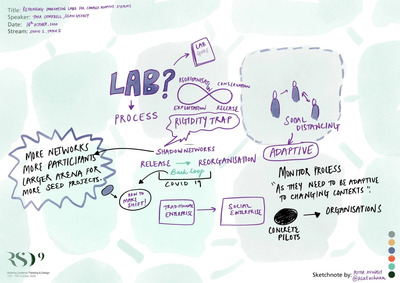Rethinking innovation labs for complex adaptive systems going through release and reorganization
Campbell, Tara and Geobey, Sean (2020) Rethinking innovation labs for complex adaptive systems going through release and reorganization. In: Proceedings of Relating Systems Thinking and Design (RSD9) 2020 Symposium., 9-17 Oct 2020, Ahmedabad, India.
Preview |
Text
Campbell_Rethinking_RSD9_2020.pdf Available under License Creative Commons Attribution Non-commercial No Derivatives. Download (186kB) | Preview |
Preview |
Text
Campbell_Slides_2020.pdf Available under License Creative Commons Attribution Non-commercial No Derivatives. Download (3MB) | Preview |
![Campbell_img_2020.png [thumbnail of Campbell_img_2020.png]](https://openresearch.ocadu.ca/3681/3.hassmallThumbnailVersion/Campbell_img_2020.png)  Preview |
Image
Campbell_img_2020.png Available under License Creative Commons Attribution Non-commercial No Derivatives. Download (1MB) | Preview |
Abstract
When working within a complex adaptive system going through the release and reorganization phase of the adaptive cycle (Holling, 2001) how should innovation lab practices shift?
We are exploring this question through an in-progress innovation lab facilitated by the Waterloo Institute for Social Innovation and Resilience. The Legacy Leadership Lab (L3) is situated at the intersection of the Canadian small business, social finance, and co-operative and social enterprise systems. The lab launched in 2019 and will continue into 2021 to explore systemic support for conversions of Canadian small- and medium-sized businesses into social purpose organizations. Originally, we intended to organize a variety of actors through a series of workshops to design initiatives that could be piloted by their organizations and communities. These plans were disrupted by the COVID-19 pandemic, which has not only foreclosed the possibility of gathering in-person but, more fundamentally, has radically transformed economic and social systems. These systemic changes have provoked us to rethink the lab’s focus and processes. Using Holling’s (2001) adaptive cycle, we suggest that the systems we work within are now in the release and reorganization phase (the “back loop”), out of the conservation phase where they had been for some time (see Figure 1). This abstract outlines how we are shifting our lab practices for the changing systems we find ourselves in.
Innovation labs go by many names: social innovation labs (Westley et al., 2015), change labs (Westley, Geobey, & Robinson, 2012), social labs (Hassan, 2014), living labs, systemic innovation labs (Zivkovic, 2018), among others. These emerge from distinct communities, and practices vary between and even within each of these lineages (Kieboom, 2014). In essence, however, they share similar foundations. Labs are “container[s] for social experimentation, with a team, a process and space to support social innovation on a systemic level” (Kieboom, 2014). They draw on participatory design, design thinking, and systems thinking, and involve creating space for dialogue and sensemaking while stewarding a group of diverse stakeholders through a systemic design process (Tiesinga & Berkhout, 2014).
| Item Type: | Conference/Workshop Item (Paper) |
|---|---|
| Divisions: | Faculty of Design |
| Date Deposited: | 09 May 2022 18:33 |
| Last Modified: | 09 May 2022 18:45 |
| URI: | https://openresearch.ocadu.ca/id/eprint/3681 |
Actions (login required)
 |
Edit View |

 Tools
Tools Tools
Tools